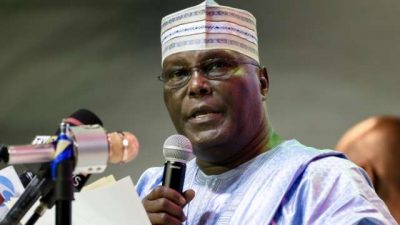Atiku’s economic plan should leave you very afraid

Atiku Abubakar has given us hints of how he intends to fix the Nigerian economy, but his proposal still leaves a lot to be desired.

One of the joys of journalism is getting to grill politicians seeking public office, looking them straight in the eye as they respond to questions and finding clues to hidden meanings from their body languages.
It’s a front-row seat I won’t trade for anything else in the world.
When Pulse peppered presidential candidates Fela Durotoye, Oby Ezekwesili, Donald Duke and Kingsley Moghalu, among others, with questions on the economy and everything in between, I saw an emerging pattern: each of the aforementioned candidates favours a free market economy and liberalisation to varying degrees. They would rather government has little to do with the economy, asides formulating monetary and fiscal policies that would spurn growth in the private sector.
Alhaji Atiku Abubakar, presidential candidate of Nigeria’s biggest opposition party, the PDP, also appears to lean toward a deregulated, liberalised economic model, a departure from what some have termed President Buhari’s ‘Command and Control’ or Keynesian economic model; where government is not shy to fix prices and the foreign exchange market.
However, I doubt Atiku’s pro-business, liberalised economic mindset a bit because unlike the new breed, anti-establishment presidential candidates cited above, he served in government for eight years in the past and was handed the opportunity by then President Olusegun Obasanjo to positively affect some parts of the economy. Atiku handled the privatization brief of the Obasanjo administration from 1999 to 2007 and earned more criticisms than plaudits for that eight year stint as Obasanjo’s deputy.
In a recent interview he granted Africa Report, Atiku says he’ll have no scruples floating the Naira and spiraling inflation if the move will make foreign investors flood the country to stimulate the economy.
“I would prefer to float the Naira because I believe that will bring about a more stable exchange rate. Therefore, foreign investors are more likely to return to Nigeria and invest as much as possible”, Atiku says.
“We have to create more incentives for foreign investments and relax conditionalities, remove regulations as much as possible. But what you forget, it has two side effects,” he adds.
Probed on if he is aware that his policy proposal could lead to inflation, Atiku doubled down:
“There could be devaluation and there could be a lot of inflow of foreign currency into the country. The devaluation that is likely to result can be balanced with the relatively huge [sums of] foreign currency that will be coming into the country. We had that situation prior to the departure of [former president] Goodluck Jonathan.
“At that time, we had a pile of foreign investments in the country, and there was stability of the naira. So people did not have to go to the central bank to look for foreign exchange because there was foreign exchange in the market and in the banks. So it could turn out to be a win-win situation,” he says.
To be fair, there is nothing wrong with a liberalised mindset from a presidential candidate. Atiku’s endgame is what this piece is calling into question, because he appears to have the right prescription for the wrong problem. He appears to be mouthing liberalisation simply because everyone else is.
Atiku’s ‘I-don’t-give-a-damn-about-inflation’ mindset worries me a bit and I’ll explain in a bit. Inflation was at double digits in 2012 (12.23 percent) and remained at single high digits from 2013 to 2015 (8.5 to 9.01), before peaking at double digits again from 2016 to 2017 (18.5 per cent to 18.7 per cent).
The economy was already heading for a recession before 2015, which was why then Finance Minister Ngozi Okonjo-Iweala kept warning that the nation should save to avoid a contraction. Her warnings were ignored and the nation plunged headlong into a recession as politicians splurged on elections before 2015. Former Central Bank of Nigeria (CBN) Governor Sanusi Lamido, also kept sounding alarm bells and blowing corruption whistles, but he was fired for his troubles.
Citing Jonathan as an example to follow, like Atiku did in the quotes above, should also be seen as a red flag of some sort. Jonathan’s economy was relatively better than Buhari’s because of high oil prices at the time and not because the nation was handed a cocktail of smart policies from assembled wonks.
The economy hasn’t been great under Buhari and even he has got to admit that dithering on the appointment of ministers for six months cost this nation dearly. Any presidential candidate who proposes to keep inflation at double digits should they get elected, like Atiku is already doing, I’m afraid, hasn’t really done his homework.
You can float the currency and keep inflation at single digit with the right mix of monetary and fiscal policies, and the right hires at the central bank and at the ministries. Investors will always come running to Nigeria if a president can create an enabling business environment by fixing electricity, roads, transportation, the ports, root out corruption and send the right signals.
Atiku has been accused of selling national assets to himself and cronies as head of the Obasanjo-era privatization drive. Add that perception to this inflationary policy proposal he just dropped and what you have is a presidential candidate who still has his work cut out for him, in terms of selling his candidature and positioning himself as the alternative to the APC and Buhari.
In the final analysis, you’ve got to admit that Atiku and the PDP are yet to think this economy thing through. And they haven’t got that much time left. (Pulse NG)

